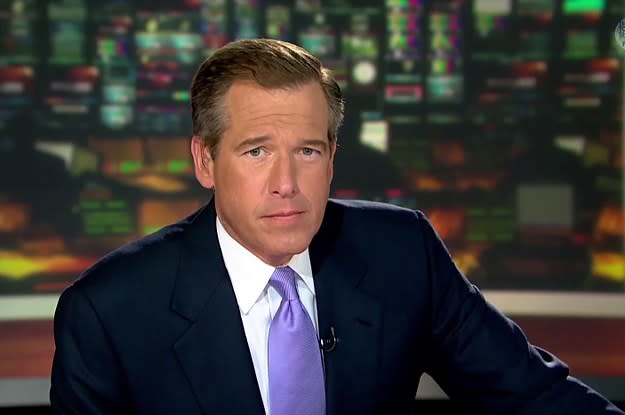Brian Williams’ Helicopter Pilot: “We Were Hit”

The pilot of the Chinook helicopter that Brian Williams was riding in back in 2003 says their chopper was hit by small arms fire, and that the lead chopper in their group was hit by an rocket-propelled grenade. These new details add confusion to the story in which Williams has been blasted for not telling the truth about the RPG hitting his helicopter.
“Mr. Williams was on board my aircraft. We took small arms fire,” the pilot, former chief warrant officer Rich Krell, told CNN exclusively today. “All I know is one RPG was fired. It struck the lead aircraft, which was about what we call six rotor disks in front of me.”
Those incoming bullets, he said “struck the belly up in the forward cabin area and one or two other side hits, but it didn’t cause any major damage, just some minor damage to electronic components.”
Krell said Williams would have been aware his helicopter had been hit because of the ping of the bullets and the fact the crew was returning fire.
“The door gunners were returning fire. M60s (machine guns) are very loud. The pings of the bullets hitting us…there were only a few, but it’s a distinct sound.”
Krell’s account of the incident stands in marked contrast to Stars and Stripes’ interviews with several crew members on the 159th Aviation Regiment’s helicopter was struck by the RPG. They said Williams was nowhere near that aircraft or two other Chinooks flying in the formation that took fire.” Stars and Stripes reported Wednesday that “Williams arrived in the area about an hour later on another helicopter after the other three had made an emergency landing, the crew members said.”
And, on Wednesday, Sgt. 1st Class Joseph Miller, who was the flight engineer on the aircraft that carried the journalists, told Stars and Stripes: “No, we never came under direct enemy fire to the aircraft.”
“Some of things he’s said are not true. But some of the things they’re saying against him are not true either,” Krell told CNN today of the Stars and Stripes report.
According to Krell, three helicopters were flying in close formation, not four, as Williams had said; one of the choppers broke down, Krell said.
Williams was in the back of Krell’s aircraft along with three other NBC staffers. Krell referred to his Chinook as the “second bird” in the formation. The “first bird,” right in front of the “second bird,” was struck by the RPG.
All three of the helicopters were hit by small arms fire, Krell said, supporting Williams’ past claims about that.
Krell said his helicopter was hauling metal bridges, which “took most of the hits.”
He said the three Chinooks took evasive maneuvers and his helicopter dropped off its payload, then met up with the other two about 45 minutes later.
Krell said he had “not taking issue” with other elements of Williams’ account, adding “I agree he needed to apologize” to those on the helicopter that did in fact take an RPG hit that day. “That’s a life-or-death situation they walked away from. I can understand why they take issue” with Williams’ years-long incorrect account of what happened.
Williams’ claim his helicopter came under attack and was hit — “that is a true statement,” Krell said, adding, “We were all scared. That’s the truth…He was there at the time of the attack.”
Several times in since that day in 2003, Williams has said that he was aboard a U.S. Army helicopter when it was hit by an RPG on one of the first days of the Iraq War in 2003. He acknowledged on last night’s newscast he actually was in a different helicopter than the one hit by the rocket propelled grenade.
This afternoon’s interview with the pilot of Williams’ helicopter would seem to help Williams survival chances at NBC News. The division has remained mum on the incident since Stars and Stripes broke the story that Williams’ account of taking an RPG hit — a story he’s been telling for years — was not true.
This morning that publication said Williams admitted on air that he was not on the Chinook that was struck by enemy fire. But the publication took Williams to task for saying he was “instead on a following aircraft,” reporting that Army flight crews said the NBC anchor was actually flying with a different helicopter company altogether — in a different direction, and linked to the attacked unit by radio only. The publication called it “another example of the anchor muddling the facts or providing misleading details” of the incident that he covered in the opening days of the Iraq invasion.
Related stories
Brian Williams' “Chinookgate” Spawns Crisis For NBC News, Zelig-Style Comedy On Twitter
Dan Rather: Brian Williams Is An “Honest, Decent Man”
Brian Williams Recounts False Chopper Story On Letterman In 2013
Get more from Deadline.com: Follow us on Twitter, Facebook, Newsletter
